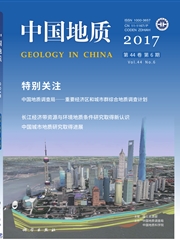

 中文摘要:
中文摘要:
普兰蛇绿岩位于雅鲁藏布江缝合带西段,面积约650 km2,主要由方辉橄榄岩、含单辉方辉橄榄岩和透镜状纯橄岩组成,缺失堆晶岩和枕状熔岩等洋壳端元。方辉橄榄岩中普遍发育辉绿岩和辉石岩脉,地幔橄榄岩上部被块状玄武岩、玄武质火山碎屑岩、粉砂质泥岩、硅质岩和硅质灰岩覆盖。辉绿岩低K、Ti,球粒陨石标准化REE配分曲线具有N-MORB特征,富集LILE(K、Sr、Rb),亏损HFSE(U、Th、Nb),(143Nd/144Nd)t=0.512904~0.512909,εNd(t)=+8.6~+8.7,(87Sr/86Sr)t=0.704893~0.705310,显示俯冲带弧后盆地环境的特征。对比前人研究,认为雅鲁藏布江缝合带普遍存在洋内俯冲作用,但开始俯冲的时间不同:雅鲁藏布江缝合带中西段开始于早白垩世,而东段开始于中侏罗世。
 英文摘要:
英文摘要:
Ophiolites that discontinuously crop out along the Yarlung-Zangbo suture zone (YZSZ) are remnants of Neo-Tethyan ocean lithosphere emplaced during subduction of the Indian plate beneath Eurasia. The Purang massif is one of the largest ophiolites in the western part of the suture with exposed area of about 650 km2 and consists dominantly of harzburgites, minor Cpx- harzburgites and dunites as well as a series of uppermost crustal rocks (siliceous limestone, siliceous shale, chert, basaltic lavas, and pyroclastic rocks), without cumulate rocks and pillow lava. In the northwestern part of the massif, peridotites were intruded by diabase dykes and sills. The diabases show N-MORB type REE patterns with (143Nd/144Nd)t being 0.512904~ 0.512909 and εNd(t) +8.6~+8.7, and are characterized by LILE (mainly K, Sr, Rb) enrichment and noticeable Nb, Th and U negative anomalies. They have a supra-subduction affinity and were formed in a back-arc basin setting. A comparison with other YZSZ ophiolites suggests that various intra-oceanic supra-subduction events within the Neo-Tethys began in different periods. The oceanic crust of the eastern part of YZSZ was formed in about Middle Jurassic in the back-arc basin, while those in central and western segments were formed in about Early Cretaceous above the SSZ setting.
 同期刊论文项目
同期刊论文项目
 同项目期刊论文
同项目期刊论文
 期刊信息
期刊信息
